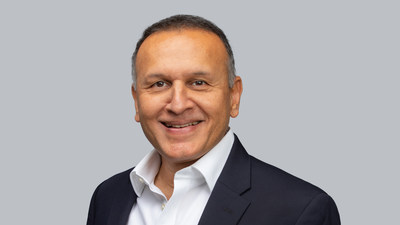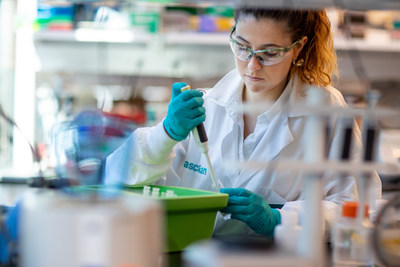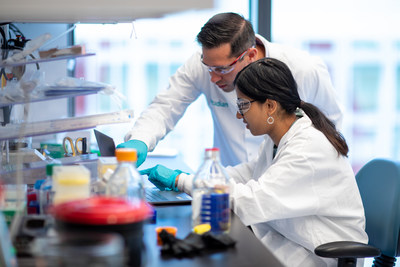ATP, a leader in life sciences venture capital, today announced the launch of Ascidian Therapeutics, a biotechnology company built and developed by ATP and funded with a $50 million Series A financing.
|
|
| [12-October-2022] |
|
ATP incubated and built Ascidian with $50 million in Series A funding Pioneering RNA exon editing platform expands therapeutic possibilities to treat diseases not addressed by today's gene editing technologies Lead program targeting ABCA4 retinopathy moves toward IND RNA medicines expert Romesh Subramanian, Ph.D., joins Ascidian as President and CEO; ATP Chief Scientific Officer and Venture Partner Michael Ehlers, M.D., Ph.D., to serve as Board Chair NEW YORK and BOSTON, Oct. 12, 2022 /PRNewswire/ -- ATP, a leader in life sciences venture capital, today announced the launch of Ascidian Therapeutics, a biotechnology company built and developed by ATP and funded with a $50 million Series A financing. With a focus on treating human diseases by replacing mutated exons at the RNA level, Ascidian's technology enables therapeutic targeting of large genes and genes with high mutational variance while maintaining native gene expression patterns and levels. This approach is designed to provide the durability of gene therapy while reducing risks associated with DNA editing and manipulation. Ascidian is advancing its lead program for ABCA4 retinopathy in IND-enabling studies while it progresses its pipeline of programs in ophthalmology, and neurological, neuromuscular, and rare diseases. Romesh Subramanian, Ph.D., formerly founder and CEO of Dyne Therapeutics, is Ascidian's President and Chief Executive Officer. Michael Ehlers, M.D., Ph.D., Chief Scientific Officer of ATP and a Venture Partner at the firm, was founding CEO of Ascidian and led its incubation; he will become Chair of Ascidian's Board of Directors. "I am excited to join Ascidian because the company's technology truly has the potential to rewrite RNA. This will enable us to expand the therapeutic potential of RNA medicines for patients who are awaiting breakthroughs," Dr. Subramanian said. "Ascidian has the capability to redefine the treatment of genetic diseases by editing exons at the RNA level. Using this approach, we can replace genes too large to package into a viral vector as well as genes with high mutational variance, all of which are currently beyond the reach of gene and base editing approaches." Ascidian's platform deploys high-throughput molecular biology in tandem with cutting-edge computational biology. A single Ascidian RNA editor can replace multiple mutated exons simultaneously, without modifying DNA, thereby limiting the risk of off-target DNA edits and expression of transgenes in off-target cell types. Moreover, the technology does not require the introduction of exogenous enzymes, reducing the risk of immunogenicity. "ATP built Ascidian because we believe that rewriting RNA has the potential to fundamentally transform the fields of RNA therapeutics and gene editing by addressing the underlying causes of disease," Dr. Ehlers said. "We are thrilled to welcome Romesh at this critical time in Ascidian's growth as we advance our lead program toward the clinic and expand our pipeline with programs aimed at bringing novel treatments to patients in need." Ascidian's technology is based on RNA trans-splicing, a phenomenon observed in multiple organisms, including ascidians—ancient ancestors of vertebrates—which deploy trans-splicing to re-engineer their transcriptome. As applied by Ascidian, RNA trans-splicing enables excision of disease-causing exons and their replacement with wild-type exons in a single reaction to treat disease. Lead Program Targeting ABCA4 Retinopathy
IND-enabling activities are under way for Ascidian's lead program targeting ABCA4 retinopathy, including Stargardt disease. Stargardt disease is the most common form of inherited macular degeneration and affects approximately 30,000 individuals in the United States alone. Stargardt disease is caused by mutations in the ABCA4 gene which can lead to progressive retinal degeneration and vision loss, typically beginning in childhood and young adulthood.1 More than 900 mutations across the ABCA4 gene have been found that cause Stargardt disease.2 These mutations result in varying degrees of protein expression and disease severity. Diseases caused by ABCA4 loss of function are examples of genetic disorders that cannot be addressed by standard gene replacement, given the large size of the gene, or by base editing, due to the high mutational variance of the affected gene. Ascidian presented data earlier this year at the 25th Annual Meeting of the American Society of Gene and Cell Therapy showing that sub-retinal administration of one of its ABCA4 exon editors resulted in expression of full-length ABCA4 protein in non-human primates.3 The company has demonstrated excision and replacement of mutated RNA exons with wild-type RNA sequences in multiple genes and cell types, and is advancing programs in ophthalmology, and neurological, neuromuscular, and rare diseases in preclinical studies. Company Leadership
Dr. Subramanian joins Ascidian from Dyne Therapeutics, which he founded, and where he served as Chief Scientific Officer and CEO. Prior to Dyne, he co-founded Translate Bio (formerly RaNA Therapeutics), which was acquired last year by Sanofi. Dr. Subramanian has held numerous scientific leadership and advisory positions in RNA therapeutics and currently serves on the advisory board of the Harvard Medical School Initiative for RNA Medicine. He holds a B.S. degree from Loyola College, an M.S. degree from Duke University, and a Ph.D. from Emory University. As Board Chair, Dr. Ehlers brings his deep scientific and business expertise to Ascidian. Before joining ATP, Dr. Ehlers was head of R&D at Biogen and, prior to that, headed Neuroscience and Rare Disease R&D at Pfizer. At ATP, he has led investments in ATP portfolio companies, including Ascidian Therapeutics, Aulos Bioscience, Intergalactic Therapeutics, and Replicate Bioscience. Dr. Ehlers earned a B.S. degree from the California Institute of Technology and holds M.D. and Ph.D. degrees from the Johns Hopkins University School of Medicine. A current list of the Ascidian leadership team and Board of Directors can be seen at ascidian-tx.com. About ATP
Founded in 1999, ATP is a leader in life sciences venture capital, with $2.65 billion in committed capital and offices in New York, London, San Francisco, and Cambridge, MA. ATP creates companies starting at various stages, from pre-IP ideas to asset spinouts, investing in them from seed stage through IPO and beyond. The core of ATP's strategy is providing flexible capital and access to a world-class team of venture partners and EIRs, to build sustainable, research-driven enterprises that deliver therapeutics to improve human lives. For more information, visit www.appletreepartners.com. About Ascidian Therapeutics
Ascidian Therapeutics, an ATP company, is redefining the treatment of disease by rewriting RNA. By editing exons at the RNA level, Ascidian therapies enable precise post-transcriptional editing of genes, resulting in full-length, functional proteins at the right levels, in the right cells, at the right time. With active discovery and preclinical programs in ophthalmology, and neurological and neuromuscular disorders, and other rare diseases, Ascidian is opening new therapeutic possibilities for patients in need of breakthroughs. For more information, visit www.ascidian-tx.com.
SOURCE Ascidian Therapeutics |










